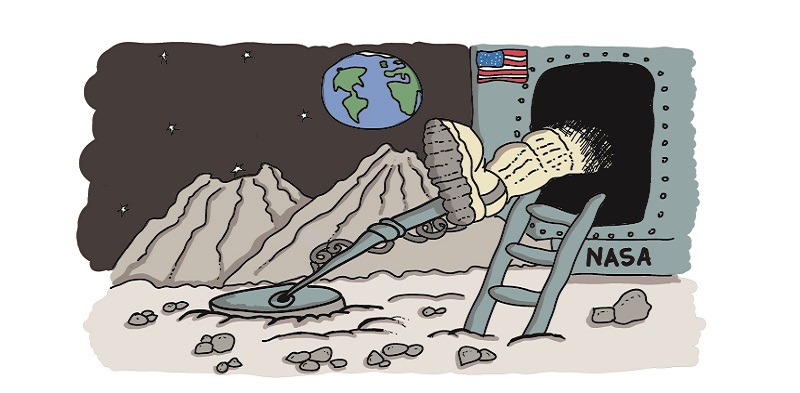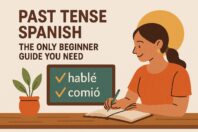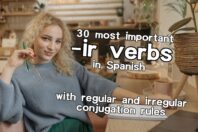Past Progressive in Spanish: “-ing” for the Spanish Past Tense Explained

Get our free email course, Shortcut to Conversational.
Have conversations faster, understand people when they speak fast, and other tested tips to learn faster.
More infoWe’ve already covered how to use the present progressive in Spanish (e.g. I’m walking). The progressive tense is the “-ing” tense.
If you haven’t read that post, definitely read that first, as this builds upon that.
The past progressive is for these “ing” cases, in the past. For instance, “I was walking” (yo estaba caminando).
Past Progressive Structure
The core structure is the exact same as the present progressive, except instead of the present tense of estar, we’re using the past (imperfect) tense.
Ella estaba comiendo
Subject + ESTAR verb (past) + Progressive verb
Affirmative form
- Fabián estaba comiendo sushi. (Fabian was eating sushi)
- Sandra estaba viviendo en Panamá. (Sandra was living in Panama)
- Andrés estaba bebiendo cerveza. (Andres was drinking beer)
Negative form
- Johana no estaba comprando ropa. (Johana wasn’t buying clothes)
- Ana no estaba enferma. (Ana wasn’t sick)
- Zoi no estaba triste. (Zoi wasn’t sad)
Questions
- ¿Carlos estaba trabajando el sábado? (Was Carlos working on Sunday?)
- ¿Qué estaba haciendo Max? (What was Max doing?)
- ¿Por qué estabas comiendo tanto? (Why were you eating so much?)
Estar Conjugation
This is built of knowing the conjugation for estar in the past (the “imperfect”). Here’s that conjugation for a refresher:
| English | Spanish |
|---|---|
| I was | Yo estaba |
| You were | Tú estabas |
| He was | Él estaba |
| She was | She was |
| It was | Eso estaba |
| You were (formal) | Usted estaba |
| They were | Ellos/Ellas estaban |
| You (plural) were | Ustedes estaban |
| We were | Nosotros estábamos |
Past Progressive Spanish Practice
Here’s some practice exercises. For more free training, get our private flashcards here.
Exercise 1
Complete the conjugation with the verb estar in past + the progressive verb suggested.
- Carlos estaba ____________ una pizza. (comer)/(Carlos was cooking pizza)
- Andrés ________ ____________ con su padre. (pescar)/(Andres was fishing with his father)
- Cristina _______________ _____________ en el examen. (copiar)/(Cristina was cheating in the exam)
- Rafael no __________ ___________ su auto. (reparar)/(Rafael wasn’t repairing his car)
- Martha no __________ ____________ bien su trabajo. (hacer)/(Martha wasn’t doing her job well)
- Yo ______________ ____________ un libro. (leer)/(I was reading a book)
- El artista _____________ _____________ su trabajo. (terminar)/(The artist was finishing his work)
- Sara no _________ __________ lo que yo le _________ _________ (entender/explicar)/(Sara wasn’t understanding what I was explaining)
- Ellos ____________ __________ por celular.(hablar)/(They were talking on the phone)
- Mi profesora __________ ___________ la lección (explicar)/(My teacher was explaining the lesson)
Key:
- cocinando
- estaba pescando
- estaba copiando
- estaba reparando
- estaba haciendo
- estaba leyendo
- estaba terminando
- estaba entendiendo / estaba explicando
- estaban hablando
- estaba explicando
Exercise 2
Choose the correct option according to the image.
- Jorge estaba montando en su bicicleta
- El conductor de bus estaba dormido
- Carlos estaba conduciendo el bus.
- Mi padre estaba podando el pasto de mi jardín.
- El conductor estaba usando una camisa negra.
- El chef estaba flameando su plato con cognac.
- El chef estaba usando un gorro rojo.
- Fernando esta sentado en el parque.
- El chef estaba enfermo en su casa.
- Ese hombre estaba tocando guitarra.
- Claudia estaba almorzando con sus compañeras.
- Claudia estaba haciendo deporte en el bosque.
- Claudia y su madre fueron de compras.
- Claudia estaba trabajando en su escritorio.
- Claudia estaba tomando clases de natación.
- Ana estaba estudiando en el laboratorio.
- Ana se estaba preparando para ir al colegio.
- Ana y Jorge estaban comiendo en el restaurante.
- Ana estaba visitando a su madre en el hospital.
- Ana estaba escuchando música y leyendo.
- La niña estaba besando a sus padres.
- Papá y mamá estaban besando la niña.
- La niña estaba nadando en el mar.
- La niña estaba sentada con sus padres en la playa.
- Los padres de la niña estaban trabajando.
Key:
- Carlos estaba conduciendo el bus.
- El chef estaba flameando su plato con cognac.
- Claudia estaba trabajando en su escritorio.
- Ana estaba escuchando música y leyendo.
- Papá y mamá estaban besando la niña.
That’s all! If you have questions be sure to leave a comment and we’ll explain things further ?








